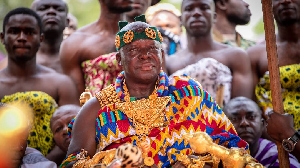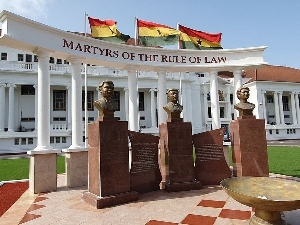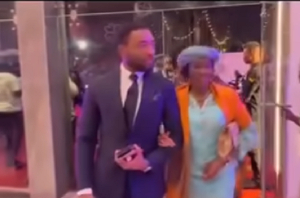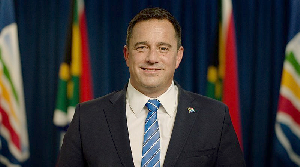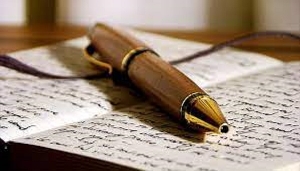Opinions of Saturday, 26 February 2011
Columnist: mercy bolus
Time to generate money for community development in every region!
Museum, Libraries, Community Centres are essential public asset no Government can deny it citizens. It is rather unfortunate that many communities in Ghana do not have these basic amenities. These are venues for generating money if communities know how to. Libraries are vital and motivate locals to seek more about their local village or town.
Ghana’s story has been from riches to rags syndrome. Sadly, Ghana went backwards from being comfortable in the 1960 having shops like UTC, Kingsways stores similar to John Lewis in the U.K to abject poverty. Many people in the Western society would find this hard to believe about Ghana who really had it all once upon a time.
The youth of the 1930- 1960’s used to have ballroom dancing and we need to display such photos in galleries to show our civilisation. Ghana has gone through the years as being the richest nation in Africa on it own rights. Today Ghana has been branded a Third world country and one of the poorest nations needing prop up with foreign loans with high interest rate that is crippling the country. Clothing such as wedding dress, shoes, any ornaments that could be presented to represent a person might be useful. Display what Ghana classify as traditional dressing in the past until now.
Stories books used in the past could be organised workshop of what Ghana used to be like during the seasons and festivals throughout Ghana. This could be in museum on o DVD. Museum or organisations could even make a business out of re-acting the significant wars in Ghana in our effort to retain our dominance over foreign invaders to seize Ghana from the 13 century onwards. The link we have with Seychelles and why came to be. For example, arrival of the Europeans, The Slave Trade routes, British Crown Colony, Yaa Asantewaa War and the attack of British Fort in Kumasi. The demand of the Asante Golden Stool by the then Colonial Governor Frederdick Hodgson in 1900 and the quick thinking of the Palace to give him a fake one instead. Independence, the betrayal of Kwame Nkrumah etc. Re-act the slave trade in Cape Coast for the appreciation how our ancestors sacrificed their lives and comfort and went through this emotional journey so that the world would be a better place for all of us. Candles can be sold for tourists to light and pray for their ancestors. This is a special moment for any individual whose ancestors sacrificed in any way.
Run workshop to teach the public how we engage in Art and craft in partnership with the Ministry of Tourism which depicts a community true identity. For example, in the Volta region- weaving Kente, or the eastern way of cooking, The North or the West. Things to remind customers to the museum to relate or connect where people come from.
Every community may need to reflect on any family member who had made a difference in their community, write short history and attached framed photo of a deceased relative or living person for presentation at their local Museum
Any artefacts or unwanted old fashion piece of furniture could also to present to depict a way of living in the past in that community museum.
What are the forms of communication we had in 1700. Is we have workshop for the youth to experience these years and advantages and disadvantages.
What are the experiences from the way use public bathrooms in 1950’s. There transformation of sharing of public open door bath rooms to using of toilets in compound houses to individualistic baths and toilets. Are there any romantic stories from unroofed public baths rooms worth telling? Displays of cleaning materials used in 1900, for example the various types of brooms used in all our regions until present age.
Display fishing methods within each community and catches made and the basic tools used until present day.
Introduction of the poll tax and the consequences in the 1950’s is there any history written about this?
Wild game, hunting etc which animals are culled and which considered as scared.?
Some of our traditions may appear rigid but they had a place for law and order within the community taking for example the rules and practice of the traditional priest and we need to translate their reasoning for their actions.
Conservation clauses built into the traditional priest’s rituals and the significance of the laws to a community. It appears some of such laws were obeying the laws of the land and giving respect to the maker. Though some are still practiced violate Human rights of the vulnerable and must be challenged as to the benefits it gives to the individual. Move from the olden days with every home using grinding stone, to until the invention of the blender. We need to encourage participation of this experience.
Our traditional way of sitting on stool and still traditional practice in Royal homes
Meaning of the pouring of libation in the Volta region, East, West and the North. This could shared through post cards could be sold selling the meaning of each libation. People would like to know more about the way we do things What did we use instead of modern pants. The reason behind wearing of our beads and a small cloth to cover the private parts to the present age of wearing trendy pants.
Our lighting system where did we start? These will need to be displayed in museums.
How were children educated in the past 1900 and work it until now. What many people in the West do not know was the rich and famous sent their children to boarding schools. Encourage children to wear our school uniforms we used in the past as a workshop to experience our past. Introduce a charge for every the experience gained. Introduce the hiring of the outfit to use for acting and charge. Run any workshop on a similar project i.e. kente weaving, basket weaving and charge just One New Ghana Cedi for a one hour session each person. Summer huts could be used to provide these facilities.
Display ancestors who went to the U.S.A to study and returned home to contributed to our developed of education for example, Rev Osabutey Aguedze and others who was in the US in the 1930’s retuned to Ghana and in the transformation of basic schools to higher education known as the secondary schools in Ghana.
Our agricultural techniques and progress made to this date.
Have a souvenir shop within the grounds of the museum to sell any momentum; the various idioms used within each region, tribe in a booklet pocket size.
Have a cafeteria to sell coffee, tea, scones, etc.
Show the process of building using mud, one as the start of the building and the other the finished mud building. This needs to be done inside the museum on a very small scale though.
Sell photos of the Methodist Church at Palladium and other foreign influence building, most of our castles. If you have one in your region flaunt it. For example ancient building eg, of churches, shrines, etc.
Display the use of Ghanaian languages in little books (pocket size) about the formation of languages i.e. a shoe in the Ga language is the same, as a shoe in the Portuguese language as well as fork in the Ewe language is the same as the Portuguese?
Our way of writing in the 1900 is completing different compared to how students write these days and any and proof of these needs to be displayed.
Papa meaning father is rather by the elite in the western world as well as and Mama meaning mother etc.
Provide areas within the grounds of the Museum for visitors to have a cup of coffee and drinks.
Engage the children in treasure trails and have play grounds see-saws and integrate a practicable garden to reveal the beauty of our tropical plants and trees with the grounds of the museum.
Big out all the old kitchen cabinet everyone used in the 1900 etc.
Display all the different variety of coal pot and how we have been innovative in designing our own gas stove. Corn milling process and others need to be displayed. Buy old corn miller and use in the museum.
Nothing is primitive, as anything is art. Beauty after all is in the eyes of the beholder.
Display of various doormats, baskets and others, banku stick, pot, coolers, fan (papa) anything we used in the past.
Efforts need to be put into the way items are presented in museum is very important, as it is a form of marketing that product.
Funeral celebrations are unique in Ghana often too expensive families leaving living families with unnecessary debt. However, photos of the deceased could be displayed in the museum with a short history particularly when they have made contributions in their community. As a nation who loved funeral celebration we could also display some few sample of coffins in the museum. An audio -tape of how process of the funeral arrangement could be shared in this way.
If there have scouting and brownies in any region please do show photos of that link.
This might be an opportunity for people to show off their ancestors and their achievement to the world whether during the 1st and the 2nd World wars etc. Ghana Legion could be given a high profile through such activities.
There is this wealth of history and knowledge just wasting away in our cupboard to be mined manipulated and cash in for development of local communities. Even charging just One Ghana New Cedi.
Boarding schools are so common in Ghana and the preparation for students in the past to go to such school needs to be re- staged. Display the trunk, chop box (box students used for food essentials), iron used in the 1900, etc. and photo of people in boarding school in 1900 etc.
His time to dig out all the famous people who fought hard to establish secondary schools etc. and give them the respect they are long due.
These are just thoughts that came to one mind but do add on.
Carrying water on head workshop could be created in a workshop. The experience is unique. Many people would love to experience this balancing act we take for granted.
Ghanaians must learn to remember anyone who has contributed to history.
Community centre would unite the people of a local community to strategically plan for things that matters to them most and others.
Tourist guides could do booked for the day f depending of the extent of the tour perhaps. Hopefully through the Museum at least there would be form registration system in place. The Museum manager could pay tour guide at the end of the day.
All these amenities could ensure that a community becomes educated in the little things that really matter to their understanding with the world around them.
If any community who do not have such amenities, it might be the time to club together to ask NGO’s. All businesses need to help out through complying to their organisation’s social responsibility clause.
If there is enough money generated create a water fountain within the town centre or a mini round about with flowers in the centre or a statue of a famous person with the community.
What Ghanaians may need to consider is that a community would only to happy to function when nearly most people have access to these amenities..
Does your community have these basic facilities though? This is everyone’s responsibility to make a difference for their community before they pass onto the next world.
We all have a responsibility contribute to a community in order to leave that legacy on earth before we pass away. Remember that every city, town or village do have unsung heroes waiting to be discovered.
All these shared initiatives are here for every community to grasp the nettle and to emulate them in the process generate much-needed funds for the development of the towns and villages.
Ghana and most African countries have a wealth of histories still untold stories waiting to be explored and exploited. It may be a great idea for community leaders to meet up with DCE who would link up with central Government to spell their objectives for their town or village in black and white (a working document ) for all concerns to make it a strategic focus.
Good luck to any community who would love take this challenge!


